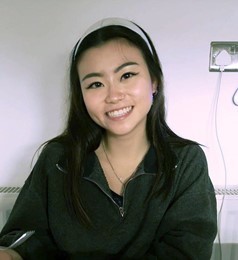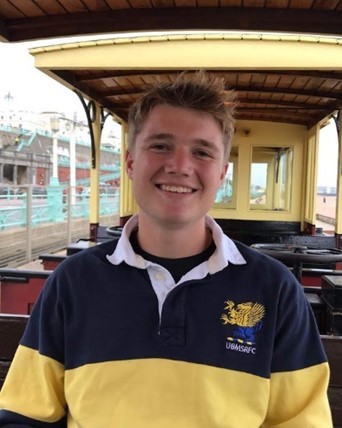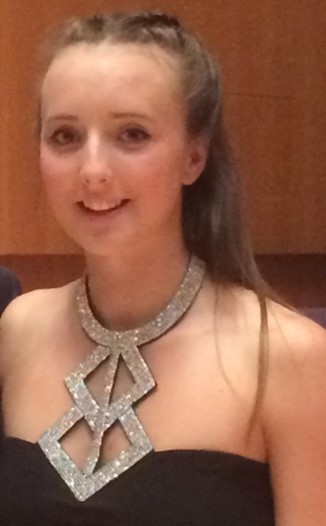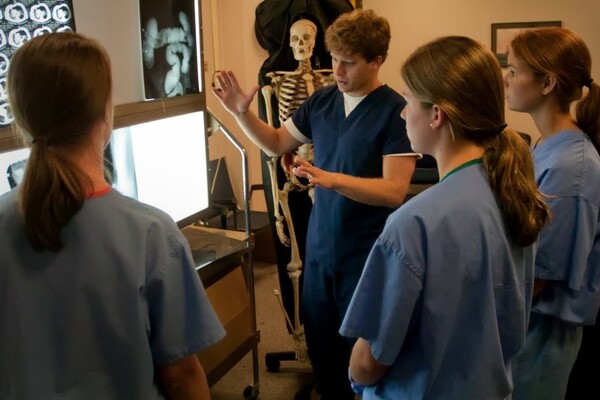Those of us who work in the NHS have witnessed first hand the significant impact of the COVID-19 pandemic on the health service.
What has been perhaps less noticeable is the major impact that the pandemic has had on medical students' training opportunities.
Here 4 of our PEdSIG student members share their experience of the pandemic and discuss how it has impacted on both their studies and personal lives. We are very grateful to all of them for taking time to share their experiences!
Jessica

My name is Jessica, a second-year medical student from University of Birmingham.
Around March (when lockdown was introduced), a lot of changes were implemented to my course. The last 5 weeks of teaching (lectures, small group tutorials, anatomy practical sessions etc.) before the end of the semester were all moved online. As this decision of transitioning from face-to-face teaching to online learning was made very abruptly, I’d found it difficult to adjust to this new style of learning. Instead of attending the lectures at specific times stated on a timetable, they were delivered in a pre-recorded format, for us to access in our own time. Small group teachings and anatomy practical sessions turned into self-directed learning sessions, with guidance and support on how to complete these tasks outlined on our course’s Canvas page.
With the course introducing more aspects of independent learning, I’d found it challenging to allocate time solely for studying and having to organise my own timetable. It was hard to stay focussed and stick to my schedule.
Due to the difficulty of transitioning our end-of-year exams from in-person exams to an alternative online format in such a short space of time (our exams occur in May), all exams for pre-clinical students were cancelled. They were replaced with Canvas formative quizzes and coursework-based assessments, to test our knowledge on the teaching materials received across the academic year.
The exam cancellation was a massive relief for me, as I was just getting used to online learning. It meant I had plenty of time not only to further consolidate on the teaching I’d received throughout the year, but also to improve my independent learning skills. Having deadlines for the alternative exam activities was helpful; from this, I have learnt how to prioritise my workload and consequently how to effectively organise my time to study independently.
Since starting my second year, the course has fully transitioned to online-based learning, with lectures being delivered in a pre-recorded format and small group teaching and anatomy practical sessions being delivered via Zoom to consolidate our learning from the lectures. It was easy to motivate myself to study as preparation for the Zoom activities is needed in order for me to fully engage in the teaching sessions. Although I prefer face-to-face teaching, I’ve found learning online very enjoyable this year, as I’ve adapted to independent learning. So far, the only downside of second year is not being able to have a lot of contact with my peers.
Apart from studying, I volunteered as a porter, working at a local hospital over lockdown. I witnessed first-hand the impact of the COVID-19 pandemic on the NHS, its staff and the patients. Therefore, the non-academic aspect of my student life during the pandemic was very insightful. Being a key worker during the pandemic was such a rewarding and memorable experience. Not only did it significantly impact my university experience in such a positive way, it had also made a lasting impression on me, as a medical student.
Alex

Hi Everyone, I’m Alex - a third-year medical student from the University of Birmingham.
September 2020 was the beginning of my clinical placements. Hospital wards were unexplored and daunting; I was unsure of what to expect. This year, the shift to remote learning has facilitated teaching to large groups. Supported by the University, educators utilised virtual platforms for efficient uploading of lectures to be viewed on demand. Personally, I preferred this to the typical format, as it gave me flexibility to study what I wanted to, when I wanted to, at my own pace, whilst also affording me a few lie-ins avoiding the bleary-eyed trek into the Medical School for a 9am start!
However for me, online teaching cannot replace bedside learning experiences because this is where I feel I learn the most. But despite teaching being delivered in small groups, the increased necessity for masks has made it feel less personal than I had hoped for. Permanently behind a mask I am less recognisable, and it is more difficult to form student-teacher relationships. I have gained the most from near-peer teaching as having experienced what I am currently going through, just a year ago, they know how to best pitch the knowledge I need to progress.
Students too have needed to adapt quickly in a changing work environment to benefit from learning opportunities. The exclusion of third-year students from fit-testing meant that COVID ‘hot’ wards were not accessible resulting in the number of clinical areas available to attend being decreased. Learning experiences were further hindered by the three-student limit per ward. As a consequence, during some weeks of my placement I was confined to sitting in hospital common rooms and libraries writing out lectures, not the experience I had anticipated. Inadvertently, this created a relatively cut-throat environment at the beginning of the year. Times recorded on attendance sheets began getting earlier, as students arrived well in advance of ward rounds to secure their place. Fortunately, this approach relaxed as the semester progressed, meaning everyone’s alarms are now set at more reasonable hour, enabling educational opportunities to be more evenly distributed.
Simultaneously, a wide range of conferences and seminars have moved to an online format, making them more accessible. This, combined with increased study time and the flexibility afforded to me by remote learning, has meant I have explored aspects of medicine I otherwise might not have - adding breadth to my portfolio and broadening my interests.
An innately social person, I enjoy planning events and my role as one of the Entertainment Representatives for Birmingham MedSoc- the largest in the country, is one I enjoy. Non-academic pursuits, like rugby, have been put on hold, but staying active remains my greatest stress reliever, and I have recently begun running again.
Overall, my university experience has been neither better nor worse this year. It has just been different. I have brought my academic priorities to the fore, discovered new aspects of myself and found better ways to stay connected.
Rachel

Having completed three years of medicine at the University of Liverpool, I am currently intercalating at UCL in Reproductive Science and Women’s Health MSc.
The COVID pandemic hit during my 3rd year which is a predominantly clinical year at Liverpool. As a result, we were pulled from placements in March meaning I was not able to complete my surgical rotations. I do, however, feel very lucky that I was able to complete my paediatric placement at Alder Hey just in time. In order to maximise our learning during lockdown, placement specialty leads pre-recorded several key case studies we would have observed on the placements that we missed. This was key to ensuring we were able to adequately meet the learning outcomes of these placements. Lectures were pre-recorded and small group seminars were either live via zoom or pre-recorded.
The biggest challenge for me was having our end of year exam delayed until August which led to 5 months of revision time. It was difficult to stay motivated during this time and so, I was determined to use my skills and assist during the pandemic. For 4 months I volunteered part-time at a GP’s assisting with e-consultations. The role involved completing e-consultation forms for patients unable to access the internet or assisting patients where the online form advised them to contact the GP surgery. During this time, I was able to continue practicing my communication skills, history taking and learn more about spotting red flag symptoms. Following my university exam, I took up a phlebotomy role for COVID antibody testing amongst healthcare professionals on the Wirral. This enabled me to continue practical skills I would have undertaken during cancelled placements.
Prior to placement cancellations I was unaware of how much I learnt on the wards compared to at home with a textbook. This has been a valuable lesson to ensure I make the most of my ward time in the future leading up to my final exams. Whilst there are definite positives of online learning, I don’t believe it can replace ward time. Some positives I have enjoyed are case study videos used to supplement learning and small group live online sessions that are recorded enabling you to watch it back later if you missed any information.
For me, the overall experience of the pandemic has been as good as it could have given the circumstances. It has enabled me to undertake roles I wouldn’t normally have had the opportunity to and take time to reflect and re-focus on my pursuit of a career in paediatrics.
Radhika

The COVID-19 pandemic has been a catalyst for change within medicine. Almost overnight, new and unprecedented working practices, policies and guidelines have been implemented into hospitals up and down the country and for the most part, medical education has been no different. With a national lockdown being announced in March in the UK over the course of only a few days, students were instructed to head home immediately, teaching was shifted online and upcoming assessments were radically changed (or cancelled if you were lucky). Being a practical course and one that is centred around human interaction, online learning is not something that naturally pertains to medicine. Moreover, with many educators balancing their educational roles with increasing clinical commitments, this transition to a new style of teaching was a difficult one.
Alongside many medical students stepping up to support frontline staff in clinical roles, during the pandemic students have also played an active role in delivering online medical education to each other. Unable to work on the frontline myself, I set up a peer-learning project with colleagues from the Queen’s University Belfast (QUB) General Practice Society to support my colleagues learning during the pandemic. The project was based around creating and posting daily single-best answer questions (SBAs) on Instagram (@qubgpsociety). Over the course of three months, we posted over 300 SBAs which were answered by up to 300 students, both QUB and non-QUB, each day and with positive feedback from both students and staff. Following this initial project, I have helped establish other peer-learning initiatives at my university while teaching is still disrupted by ongoing COVID restrictions. These include hosting online lectures, helping to set up an educational revision podcast and organising online mock, objective structure clinical examinations for over 40 2nd-5th year students. The pandemic has been devastating, but has also opened up new opportunities and students have been at the forefront of implementing innovative ideas to continue medical education in this difficult time.
Moreover, beyond the educational opportunities COVID-19 has provided, the pandemic has also been an important time for personal reflection. In medical school, I have found it all too easy to be swept away in the hustle and bustle of revising for exams, completing never-ending assignments, and trying to maximise points for that all, important Foundation Programme Application. COVID has been a sombre reminder about the importance of balance in medicine. Since the pandemic, I have taken up hobbies that I have always put off because of not having ‘enough time’ (making my own clothes from scratch has been a favourite), spent more time with my family and friends (socially distanced of course!) and learnt to take greater time to rest and enjoy life instead of always focusing on medicine. Going forward, I hope that I remember to keep this balance in my life and encourage all students and healthcare professionals to take the time to be kind to themselves as the challenges posed by COVID continue.


